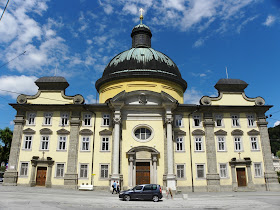Outside the Cajetan church of Salzburg your attention is drawn to the impressive dome that even changes colour at night. Inside the church, the dome with its fantastic fresco’s is also the main feature of the church interior. The fresco painting displays the Glory of Saint Cajetan, but who is this Saint? I have to admit that this was new to me. He was a diplomat who was the main advisor of the pope during the 16th century and founded a hospital to support incurable patients. He came originally from Venice.
Back to the church however, it was built in the Baroque style during the 17th century and has at the front to side chapels. The high altar is really impressive. Like in the Erhardkirche, people could not enter the church because of a closed metal gate. You see that the side chapels are actively used because of the burning candles and flowers. On the right side we saw a holy-water font attached to the wall with an angel head holding wings and in the font there was a stone fish. It is the first time we see such a font and are wondering what the artist meant by the fish. That again this water brings life?
On each side of the church buildings are connected. This was an abbey. People who like to visit Salzburg could start here at the Kajetanerplatz. It is easy to reach by car and there is an underground parking.
Aan de Cajetanuskerk van Salzburg wordt je aandacht getrokken naar de indrukwekkende koepel dat ‘s avonds zelfs van kleur vernadert. Binnen in de kerk is de koepel met zijn fantastische fresco’s ook een hoogtepunt van het interieur. Het frescoschilderij beeldt “De Glorie van St. Cajetanus” uit, maar wie is deze Heilige? We moeten toegeven dat wij dit ook niet wisten. Hij was een diplomaat en hoogste adviseur van de Paus gedurende de 16de eeuw en richtte een ziekenhuis op ter verzorging van stervende mensen. Oorspronkelijk kwam hij uit Venetië.
Maar terug naar de kerk, deze werd gebouwd in Barok stijl gedurende de 17de eeuw en heeft vooraan twee zijkapellen. Het hoogaltaar is zeer mooi. Net zoals in de Erhandkirche kunnen gelovigen de kerk niet binnen vanwege een gesloten metalen hekwerk. Je ziet aan de brandende kaarsen en bloemen dat de zijkapellen actief worden gebruikt.
Aan de rechtzijde hangt een wijwatervat met een gevleugeld engelenhoofd en een stenen vis in het water. We vragen ons af wat de kunstenaar met de stenen vis wou uitbeelden. Dat terug dit water leven schept?
Aan iedere zijde van de kerk zijn gebouwen gekoppeld, dat was het voormalige klooster. Toeristen die graag Salzburg per auto willen bezoeken kunnen hier aan de Kajetanerplatz starten. Het is makkelijk te bereiken en er is voldoende ondergrondse parking..
Previous Salzburg article: Fountains indicate the importance of horses for Salzburg
Previous Church article:
The healing force of spring water in the Erhardskirche, Salzburg
Return to main page








What beautifully clear photos today, so sharp in the details even the interior ones, the sunshine mush have helped.
ReplyDeleteHoi Filip,
ReplyDeleteFantastische foto's heb je weer gemaakt!! Prachtig om die kerk zo te zien met die schitterende blauwe lucht.
Jullie reizen toch wat af zeg, geweldig!!
Groeten, Marco
Hello!
ReplyDeletePhotos wonderful, lovely.
Wonderful post.
I send greetings.
At first I bough here was snow on the roof. I must have been hallucinating. The statuary and dome are very interesting.
ReplyDeletePrachtige foto's van deze koepel met mooie contrast kleuren,
ReplyDeletemaar ook je detail foto's van de binnenzijde zijn erg mooi.
Groetjes, Joop
Indrukwekkend, Filip ! Ook dat wijwatervat..., geen idee wat het kan betekenen...
ReplyDeleteLie(f)s.
wat een mooie kerk! stoer van buiten en elegant van binnen
ReplyDeleteThe white and gold of the interior makes a very impressive backdrop.
ReplyDeletegeweldige details laat je ons weer zien en je uitleg vind ik ook altijd heel mooi geschreven. Groetjes aan jullie alle twee, Dietmut
ReplyDeleteIt amazes me how they created such structures in those times.
ReplyDeleteeen statige kerk als je derde foto bekijkt..
ReplyDeletemet een mooie koepel en zijn plafondschilderij...
knappe detailfoto's Filip
groeten
Another great piece of historical architecture.
ReplyDeletefantastic pics, the first two are amazing with this breathtaking constarts of blue+yellow/beige!
ReplyDelete